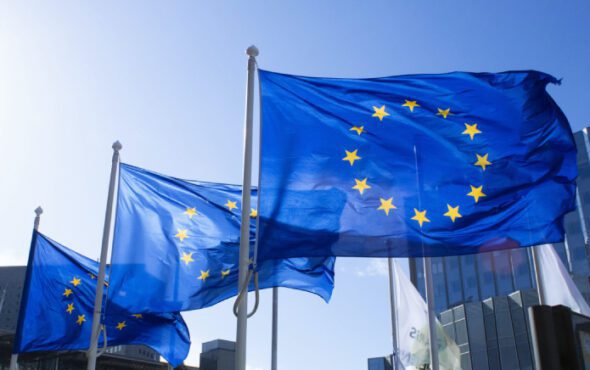
The European Union (EU) this week published proposals to ensure that LGBTQ+ parents are recognised across the bloc.
Rights campaigners said the planned regulations could be a milestone for so-called “rainbow families” that could impact rights from citizenship to inheritance.
While some EU nations recognise same-sex unions and non-biological parents, others do not. At least one child has been left stateless as a result.
“If you are parent in one country, you are parent in every country,” the European Commission president Ursula von der Leyen said in a 2020 speech promising action on the issue.
But the proposed rules would require the agreement of all member states, and could face resistance from Eastern European countries such as Bulgaria which restrict LGBTQ+ rights.
Here are all the details:
What legal obstacles do LGBTQ+ families face?
When same-sex couples in the EU decide to start a family they can face a variety of legal hurdles, said Alina Tryfonidou, an EU law professor at Neapolis University Pafos in Cyprus.
Some countries do not officially recognise two parents of the same sex, said Tryfonidou. Others ban surrogacy – often used by male same-sex couples to start a family – or lack legislation to allow the transfer of parentage after birth to non-biological parents, she said.
Even if a parent is recognised by one country, crossing a border to live in another EU nation can mean they lose their official status as a mother or father there, if that country does not recognise their relationship.
Failure to recognise LGBTQ+ parents officially has implications over child maintenance payments, tax credits, and inheritance.
It can also lead to children being denied citizenship that they are entitled through a parent. In the worst case, a child can become stateless, leaving them unable to go to school, access healthcare and state benefits, or get jobs later in life.
“These families already exist, and all you’re doing when you’re not making sure that parents and child have a legal bond is that you take away from the child the right to see their parents,” said Max Maskell, a judicial consultant at LGBT+ Danmark, a rights group.
Even holidaying in another EU country can create legal headaches – if a child requires urgent medical treatment, a parent will not be able to make decisions over emergency care if their relationship to their child is not recognised.
At present, an estimated 2 million children in the EU could see their legal relationship with their parents denied in another member state, the European Commissioner for Justice Didier Reynders said, as she announced the proposed rules.
What is the EU proposing?
The European Commission is proposing a regulation to ensure parental relationships officially recognised by one country are honoured throughout the bloc, in order to protect families who are travelling or permanently moving between countries.
The Commission also outlined plans for an optional European Certificate of Parenthood for families to provide extra evidence in another member state.
But it will not offer extra rights to people who lack recognition of their parenthood in their home country, and have not had those ties officially recognised by another EU state.
Announcing the initiative in Brussels, Reynders said the aim is not to change national law but to ensure children are treated equally “irrespective of how they were conceived or born, and irrespective of their type of family.”
Why are the proposed rules about moving between countries?
The EU has limited legal authority over parenthood rules. Each country retains control over laws regarding marriage and family matters such as whether to allow same-sex unions.
However, Brussels does have power to act when national laws clash with the right to citizens’ rights to move freely with their families throughout the 27-nation bloc.
It is using this power as the basis for the draft regulations, which aim to ensure member states recognise parental ties established in other EU nations in order to prevent barriers to travel.
Two landmark cases at the EU’s top court similarly ruled that member states Romania and Bulgaria must recognise same-sex marriages or parenthood granted in another EU nation in order to protect the families’ freedom of movement.
Both were seen as important test cases. However, three years on from the Romanian case, the judgement has yet to be applied, while Bulgaria is appealing the top court’s 2021 ruling.
The long legal battles highlight there are “no clear time lines” for getting court rulings enforced, showing the need for the EU’s proposed regulations, said Katrin Hugendubel, the advocacy director at LGBTQ+ rights group ILGA-Europe.
Will it succeed?
The proposal must be approved by all 27 EU members, meaning it could face a veto by one or more countries.
Some Eastern European nations such as Bulgaria have resisted moves to push through greater recognition of LGBTQ+ families, saying they are an attempt to change their traditional cultural norms and undermine states’ ability to set their own policy.
“You don’t need a crystal ball to suggest this draft won’t fly through,” said Hugendubel, referring to the opposition it will face from countries like Hungary which has passed numerous laws restricting LGBTQ+ rights in recent years.
If it is not approved, the proposal can be sent back to be revised or rejected.
LGBTQ+ rights campaigners predict a political battle in the months ahead.
“We all know how complicated the situation with LGBTQ+ issues is right now in Europe,” said Björn Sieverding, from the Network of European LGBTIQ* Families Associations (NELFA), a rights group.
“But what is the value in not accepting a family, and taking a parent from their child just for political gain?”
Reporting by Joanna Gill.
GAY TIMES and Openly/Thomson Reuters Foundation are working together to deliver leading LGBTQ+ news to a global audience.



